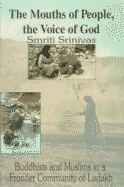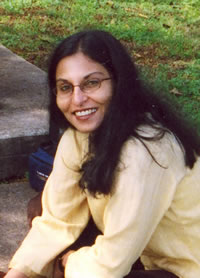The Mouth of People, the Voice of God
Buddhists and Muslims in a Frontier Community of Ladakh
Srinivas Smriti

|
|
Editeur - Casa editrice |
Oxford University Press
|

Asia
India
Ladakh
Himalaya
|
|
Anno - Date de Parution |
1998
|
|
Titolo originale
|
The Mouth of People, the Voice of God: Buddhists and Muslims in a Frontier Community of Ladakh
|
|
Lingua - language - langue
|
eng
|
|
|
|
|
|
|
|
|
|
|

|
Amazon.com (United States) - order this book
The Mouth of People, the Voice of God: Buddhists and Muslims in a Frontier Community of Ladakh |
|
|
|
|
 The Mouth of People, the Voice of God
The Mouth of People, the Voice of God

This ethnography of the Buddhist and Muslim communities in two villages of Ladakh analyzes family relations, kinship, division of labor, and gender. The author relates social structure to the distinctive ecological conditions of the region.
Contents: I. Introduction: 1. The context of this study. 2. The organization and aims of this work.
II. The frontier region of Ladakh:
1. A brief description of the Ladakh region.
2. The social groups in Ladakh.
3. Ladakh and administration by the Indian state. III. The household, integration and exchange:
1. The ethnographic site.
2. The agricultural calendar.
3. Levels of integration.
IV. The primary level of integration:
1. The household.
2. The number and types of households in Hundar and Tegar.
3. The Lama and the Imam.
4. The Chospun.
Appendix: A.
V. The secondary level of integration:
1. The occupational categories in the village.
2. The work group.
3. The Phaspun.
4. The Iftarspun.
5. The village.
VI. The tertiary level of integration:
1. The Kindred.
2. Political patriliny.
3. Conclusion-the two systems of exchange in the valley.
VII. Speaking in tongues:
1. Case I. Death in the village.
2. The monastery drama.
3. The accident.
4. The spirit possession of the Manekhang Priest. VIII. Cultural processes in a frontier community:
1. 'Mikha'--people's mouths.
2. Body, language and the structure of feeling.
3. The sensory circuit of communication.
4. Conclusion--codes and mediums.
Epilogue.
Glossary of local terms.
References.
Index.
"The Mouths of People, the Voice of God describes the social organisation and cultural processes of Buddhist and Muslim households in two villages of
the Nubra valley in Ladakh. The book is the first sociological and anthropological monograph of this valley, which lies at the foot of the Karakoram mountains in north-west India, and is based on field research done by the author in this now militarily
sensitive zone between China, Pakistan and India.
"The study interrogates purely geo-political and Tibetocentric views of the Himalayan region and instead examines it as a dynamic site composed of cross-cutting ties and various levels of integration. The frontier community is conceived as the locus of a ceaseless struggle between centripetal and centrifugal forces in the domains of language, religion and politics. Linguistic forms, together with ritual processes--for instance, oracular possession--are seen as mediating between the bodies of individuals and the body politic, redefining the limits of the personal, the civic and the sacred.
"Srinivas' book is an important contribution to the ethnographies of the Himalayan region, the study of frontiers and to cultural studies." (jacket) <
|
|
|
Recensione in altra lingua (English): |
|
My doctoral dissertation (published as The Mouths of People, the Voice of God: Buddhists and Muslims in a Frontier Community of Ladakh, Oxford University Press, 1998) is an ethnography of two Himalayan villages on the geopolitical boundaries between India, China, and Pakistan. It embeds constructions of cultural identity and cases of spirit possession within the context of borderland political economy.
Reviews
"Srinivas presents a detailed and engaging ethnographic analysis of community and religious life among Buddhists and Muslims in two villages in the Nubra valley of Ladakh."
Religious Studies Review |
|
|
|
Biografia |
|

Smriti Srinivas is Associate Professor, UC Davis
Smriti Srinivas is assistant professor of comparative and cultural studies of religion at Ohio State University.
Smriti Srinivas, Assistant Professor, Institute for Social and Economic Change, Bangalore
|
|
Consulta anche:
Biografia on line
|
|